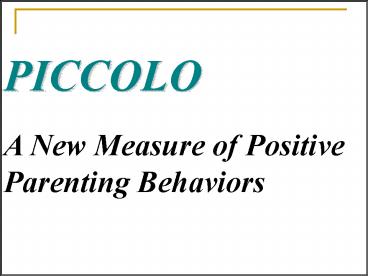HEAD START UNIVERSITY PARTNERSHIP: Measurement Development - PowerPoint PPT Presentation
1 / 22
Title:
HEAD START UNIVERSITY PARTNERSHIP: Measurement Development
Description:
Katie Christiansen. Cora Price. LauraMichele Gardner. Utah State University ... Programs working through parents to support children's early development need a ... – PowerPoint PPT presentation
Number of Views:193
Avg rating:3.0/5.0
Title: HEAD START UNIVERSITY PARTNERSHIP: Measurement Development
1
PICCOLO A New Measure of Positive Parenting
Behaviors
2
Lori Roggman Mark Innocenti Vonda Jump Gina
Cook Katie Christiansen Cora Price
LauraMichele Gardner Utah State University
Presented at Head Start Research Conference 2008,
Washington, DC
3
Introduction
- Programs working through parents to support
childrens early development need a reliable,
valid, and easy-to-use measure of developmental
parenting behaviors--the behaviors that support
childrens development. - By measuring developmental parenting behaviors,
programs can better - individualize their services to specific parent
needs, - design interventions that are truly strengths
based, - track program outcomes to guide program
improvement.
4
How was PICCOLO developed?
Used longitudinal data video archive from
Early Head Start Research Evaluation
Project (EHSRE)
Collected new data from 4,500 clips of 2,000
families (Euro-Amer, African-Amer, Latino)
Selected 29 best items from 100 items
inter-observer reliability .85 internal
consistency alpha .70 single factor structure
in each domain correlated with established
parenting measures correlated with child
cognitive language outcomes
5
PICCOLO has 4 domains
AffectionWarmth, physical closeness,
positive expressions toward child.
Responsiveness Responding to childs cues,
emotions, words, interests, behaviors.
Encouragement Active support of childs
exploration, effort, skills, initiative,
curiosity, creativity, play.
Teaching Shared conversation and play,
cognitive stimulation, explanations, questions.
6
PICCOLO domains have 7-8 items EXAMPLES
Item Scoring 0 None - Absent didnt see,
not observed at all. 1 Some - Barely
there sometimes seen but not often. 2
Lots - Consistently there seen often.
7
PICCOLO has predictive validity with child
outcome measures
MDI - Mental Development Index of the
Bayley Scales of Infant Development II
(36m) PPVT - Peabody Picture Vocabulary Test
(36m PreK) (for Spanish speakers TVIP) WJLW
-Woodcock-Johnson/Munoz Letter-Word (PreK) WJAP
- Woodcock-Johnson/Munoz Applied Problems
(PreK) BRS - Bayley Behavior Rating Scale
Emotion Reg. (36m) CBC - Child Behavior
Checklist Aggression Scale (36m PreK)
8
Affection Child Outcomes
36 - 36 month outcome PK - Pre-kindergarten
outcome. p .01 p .001 all
r .12 a controlled for test language (Eng v.
Span)
9
Responsiveness Child Outcomes
36 - 36 month outcome PK - Pre-kindergarten
outcome. p .01 p .001 all
r .12 a controlled for test language (Eng v.
Span)
10
Encouragement Child Outcomes
36 - 36 month outcome PK - Pre-kindergarten
outcome. p .01 p .001 all
r .12 a controlled for test language (Eng v.
Span)
11
Teaching Child Outcomes
36 - 36 month outcome PK - Pre-kindergarten
outcome. p .01 p .001 all
r .12 a controlled for test language (Eng v.
Span)
12
PICCOLO Domains are reliable, variable, and
internally consistent
13
PICCOLO is sensitive to program impacts
p Evaluation Project
14
- The EARLY HEAD START program had significant
impacts (controlling for family risk factors
testing only 24 36m scores) on - Responsiveness at 24m
- Encouragement at 24m
- Teaching at 24m 36m
- PICCOLO total at 24m 36m
15
PICCOLO Domain factor structures are similar
across ethnic groups
16
Affection Factor Loadings by Ethnicity
17
Responsiveness Factor Loadings by Ethnicity
18
Encouragement Factor Loadings by Ethnicity
19
Teaching Factor Loadings by Ethnicity
20
PICCOLO FINAL VERSION
- PICCOLO has 29 behavior items with a detailed
definitional guideline for each item simple
scoring form. - PICCOLO has a manual that describes the
measure, summarizes the relevant research
literature, and reports the psychometric data. - PICCOLO has training materials that orient
practitioners to the measure, guide them through
practice observations, provide information
about how to use the measure with families.
21
Lessons Learned from Program Partners
- PICCOLO is a valuable tool for identifying
strengths gaps in parenting behavior. - PICCOLO builds on family strengths when
practitioners emphasize behaviors the parent is
already doing. - PICCOLO can guide individualized strategies for
promoting parenting behaviors that support
childrens development. - PICCOLO scores can be aggregated across groups to
track outcomes of programs aiming to have an
impact on parenting.
22
We are grateful to the parents and children in
the video clips used to develop the PICCOLO
measure. Many of them were in the Early Head
Start research project. We are also grateful to
the Early Head Start Research Consortium and the
Head Start Bureau for making those video clips
available for research and to the Administration
for Children Youth Families for making the
PICCOLO project possible through Grant 90YF0050.































